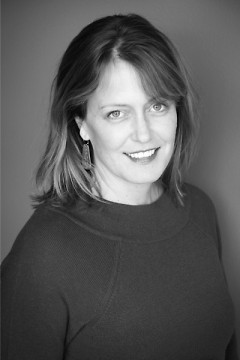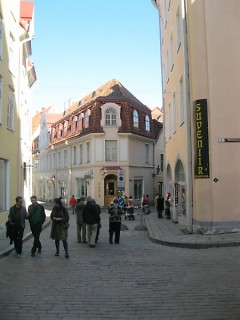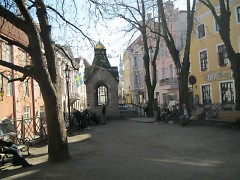If anyone had suggested a year ago to Elizabeth Goddard, Education Director at the Urban Institute for Contemporary Arts (UICA) that she’d be presenting at an arts conference in Estonia, she would have said, “Yeah, right.” And then, like the rest of us, she would have gone to Google maps and figured out where Estonia is.
But that’s what happened. Last fall, Elizabeth came across information about Eksperimenta! (E!) – a triennial multi-level international art education project. E! brings art education out from school walls with three unique components: 1) a contemporary art exhibition; 2) IDEAlaboratory – an education conference; and 3) a network of art schools and art centers.
Located in the halls at the famous Song Festival grounds, where the Estonian Singing Revolution took place 20 years ago, E! represents a similar breakthrough, this time through education.
The main aim of E! is to bring art and art education closer to each other and thus initiate sustainable changes in art education. Elizabeth is all about sustainability—she composts, recycles, and grows her own vegetables. And she’s all about art education. It was a perfect fit! Still when she submitted an application and was accepted in late 2010 it was a bit of a shock.
“I was one of only two Americans to present at the conference,” said Goddard. “That ended up being one of the best things. I learned so much from what educators are doing around the globe.” In fact, the conference drew students, teachers and professional curators from more than a dozen countries including: Brazil, Canada, Portugal, Germany, Slovenia, Turkey, Lithuania, Latvia, Estonia, Finland, Russia, South Korea, Iceland and Ireland.
Goddard’s proposal outlined the successes of ARTcation, a community wide collaboration between educators and arts organizations within Grand Rapids. ARTcation has served 8,000 students within the past two years, and provides educators with a good understanding of what it takes to organize, design and implement exciting learning collaborations between themselves and arts organizations within their community.
Goddard hopped on a plane in late April to Tallinn, Estonia and was the first to speak. “It was a little daunting at first, but ultimately it was a blessing as I was then able to sit back, relax and really take in the other presentations and all the conference had to offer.” And it didn’t hurt that Estonia is a really cool place to visit.
Tallinn, Estonia is the largest city in Estonia and the nation’s capital. A city roughly half the size of Grand Rapids, it is situated on the northern Estonian coast on the banks of the Gulf of Finland and lies west of Saint Petersburg in neighboring Russia. Tallinn's Old Town is in the list of UNESCO World Heritage Sites and Tallinn is ranked among the top 10 digital cities in the world.
So what did Goddard learn? “Urban environments are really the perfect place to explore contemporary art. A great place to start the art conversation is urban interventions – an activist art movement that responds to what’s happening in neighborhoods, on the street and in public places. Most of this type of work is done in subtle, non-invasive ways (think of someone tying ribbons around litter) yet it’s important for us to recognize it for what it is. For us in Grand Rapids that means we need to be keenly aware of who our true emerging artists are and embrace a new way of looking at contemporary art. As an educator, this is a really exciting time.”
“UICA is on a good track to align with this practice. What we value as an organization—emerging arts, new media, new ways of looking at the world—it all adds up. I look forward to exploring this topic when UICA launches our new docent program this summer. The new building is going to be a great catalyst for change – changing the way people look at art and what they understand art to be.”
For more information about UICA’s Docent Program, contact Elizabeth at [email protected].
The Rapidian, a program of the 501(c)3 nonprofit Community Media Center, relies on the community’s support to help cover the cost of training reporters and publishing content.
We need your help.
If each of our readers and content creators who values this community platform help support its creation and maintenance, The Rapidian can continue to educate and facilitate a conversation around issues for years to come.
Please support The Rapidian and make a contribution today.



